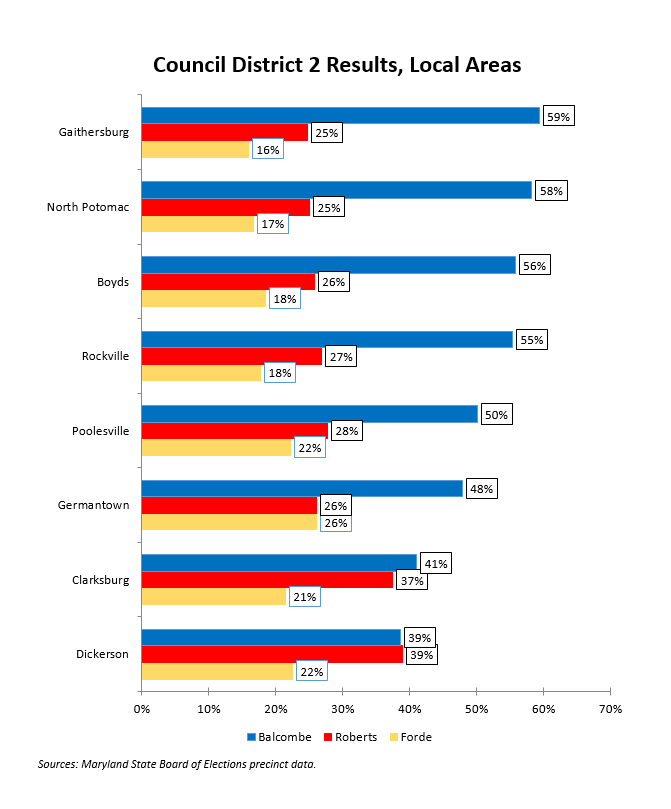By Adam Pagnuccco.
MoCo political history is full of strong female candidates who run once, lose respectably and never run again. Recent examples include Becky Wagner (2010 council at-large), Beth Daly (2014 council at-large) and Kathleen Matthews (2016 congressional district 8). Marilyn Balcombe’s name could have been on this list, but guess what? She was not having it!
Balcombe, the long-time leader of the Gaithersburg-Germantown Chamber of Commerce, is a familiar face to county insiders. She almost ran for County Council District 2 in 2010, but declined to pull the trigger when then-Delegate Craig Rice got in the race (and won). She then ran for council at-large in 2018, earning the Washington Post endorsement and finishing fifth. Balcombe’s best performances were in Gaithersburg (where she finished second), Damascus (second), Clarksburg (third), Derwood (third), North Potomac (third) and Poolesville (third). She also pulled in high vote percentages in Chevy Chase (8.5%) and Bethesda (8.1%), possibly on the basis of the Post’s support.
This time, she did two things differently. First, she ran for the open Council District 2 seat that Rice, who was term limited, was vacating. And second, she enrolled in public financing rather than employ a traditional campaign account as she did last time. These turned out to be good decisions.
Balcombe’s most prominent opponent was William Roberts, who was once a staffer for Congressman Jamie Raskin. Roberts looked like a potentially strong opponent on paper, with many progressive endorsements (MCEA, Casa in Action, SEIU Local 500, MCGEO, the career Fire Fighters, Progressive Maryland and more) along with that ultra-desirable Raskin gold dust. Lorna Phillips Forde, who finished 22nd of 33 candidates in the 2018 council at-large primary, was also in the race.
An early sign of trouble for Roberts appeared in the campaign finance reports. Balcombe was certified as qualifying for public matching funds on 8/3/21 – almost a year before the primary – and reported receiving her first tranche of matching funds on December 6. Balcombe wound up maxing out her matching funds, a sign of superior fundraising performance. Roberts was also in public financing, but he did not apply for matching funds until May 2022, just a couple months before election day. As a result, he had little cash available for mail season.
The table below shows just how huge the financial gap between Balcombe and her opponents was.

Roberts had most of the high-profile endorsements (other than the Post and the Sierra Club, which backed Balcombe) but Balcombe vastly outraised him and outworked him, turning the election into a rout. Balcombe won 31 of the district’s 34 voting precincts and earned 49% of the vote to Roberts’ 28% and Forde’s 23%. The chart below shows how Balcombe, Roberts and Forde fared in the district’s eight local areas. (See my methodology post for definitions).

In examining the chart, let’s acknowledge that these local areas do not represent equal parts of the district. 51% of the votes cast came from Germantown, 17% came from North Potomac and 16% came from Clarksburg. Balcombe led Roberts by 22 points in Germantown, 33 points in North Potomac and 4 points in Clarksburg (where Roberts lives), margins that were impossible to make up in the other areas. Roberts edged Balcombe by one vote in the sole Dickerson precinct, which was only 2% of the district.
Balcombe was a strong candidate who would have been favored in this race no matter what, but she clearly benefited from the weakness of her opponents. As it is very hard to defeat council district incumbents, she is likely to be a key point person for Germantown, Clarksburg and North Potomac for the next decade.
